Ever since she emerged in 2020, Holly Humberstone has been among the most feted new artists in the UK, with an ever-growing fanbase hanging on her every word and the industry eagerly awaiting her debut album. Now, after winning the BRITs Rising Star Award and touring with Olivia Rodrigo, Lewis Capaldi and more, the Grantham-born artist is ready to unveil Paint My Bedroom Black, the clearest expression yet of her craft. To celebrate, Music Week meets the singer, plus Polydor’s Ben Mortimer and Helen Fleming and manager Josh Sanger, to hear the secrets behind her heart-on-sleeve anthems and talk mental health, industry lessons and more…
WORDS: Charlotte Gunn
PHOTOS: Mollie McKay/Constantine Spence
Holly Humberstone is one of life’s thinkers. First captivating audiences with her debut single Deep End back in January 2020, Humberstone’s vulnerable songwriting made listeners pause for breath, her vocals giving every heartfelt lyric space to land.
A year later she would be named runner-up in the BBC Sound Of poll and in 2022 win the BRITs prestigious Rising Star gong – previously awarded to the likes of Adele, Sam Fender and Florence + The Machine – somewhat overwhelming accolades for someone who had lived most of her career through a global pandemic.
As the hype around her has continued to build, it’s taken a while for Humberstone’s head to catch up with her heart. Songwriting is what drives the 23-year-old.
“My whole view of myself is based on the last song I wrote, and whether it's a good song,” admits the singer, who starred on our cover in January 2022. Today, she’s speaking to Music Week from The Wardrobe, the Leeds venue where she’ll be giving the songs from her much-anticipated debut album Paint My Bedroom Black (out October 13 via Polydor/Darkroom/Geffen), an early outing.
Fortunately, Humberstone’s recent songs have been very good indeed. Long-distance love song Superbloodmoon, featuring viral star D4vd, has been streamed five million times on Spotify since it dropped at the end of July and recent single, Into Your Room, is fast catching up. Her biggest track on the platform is Deep End with 32m plays, while she has more than 3m monthly listeners.
The singer’s hair is tied in pigtails as she apologises profusely for the internet issues that are very definitely not her fault. She’s more talkative than her emo songs would have you believe, but frequently second guesses herself; both a ball of anxiety and excitement.
“I honestly feel like I put so much of myself into the album”, she says, adding that road-testing new songs at acoustic in-store performances is easing her nerves a little.
“There’s a song called Ghost Me that people seem to be really into, which is cool,” she smiles. “It’s been nice to do acoustic shows because it gives me an opportunity to explain the backstory and a bit about the lyrics and the writing of the song. It lets people really hear the words.”
Her evident perfectionism meant that Humberstone didn’t rush to drop a debut album off the back of a few much-loved singles. Over three years on from Deep End, and with two EPs under her belt, support tours with Olivia Rodrigo, Girl In Red and Lewis Capaldi and slots at Glastonbury and the Reading & Leeds main stage, Humbersone took her time, honing her craft and not letting the relentless Next Big Thing tips cause her to lose sight of the immediate goal: making the best debut album she possibly could.
Humberstone signed to Polydor from Platoon in March 2021 in the midst of the buzz. But Ben Mortimer, the major’s president, could immediately see the long-term potential in the young artist.
“The strategy was not to get too caught in the hype,” he says. “And allow her the space and time to make the best possible album. To do that she felt she had to live a little. As a listen, the album is all the better for it. Holly is a special songwriter with a unique turn of phrase. This album reflects that in a big way. I just hope people recognise that, and take this brilliant album to their hearts.”
“Holly was clear that she needed time to write this album”, says Helen Fleming, head of artist development at Polydor. “So we found ways to continue releasing music and speaking to her fans while she took that time to make a truly brilliant body of work.”
The Rob Milton-produced Paint My Bedroom Black puts Humberstone’s lyricism at its core. At points the album leans in a more guitar-heavy direction than her early tracks, but layered with frenetic, electronic production, she’s built a world where you can feel her angst and longing pulsating through the music. Littered with quotable lines that will please her Gen Z fanbase while also prodding something in those of us a little older (see: “Do you want to come over, to watch The OC”), it’s at times reminiscent of Lorde’s Melodrama in scale and ambition, while retaining Humberstone’s distinct honesty.
“It always comes back to storytelling and authenticity,” says manager Josh Sanger. “When I first came across Holly she wasn’t making music to appease the music industry, to win awards or to make money. She was writing because she needed it as an outlet to vocalise her feelings and come to terms with them. So every day I remind myself that no matter what happens along the way, how the industry pulls at us or how wild our ambitions are, I need to strip all that away and allow Holly to be true to herself.”
With so much already achieved, there’s a lot riding on this record. But what Humberstone continues to prove is that she isn’t in it for the quick win: she is an artist who lives to write music and Paint My Bedroom Black is clearly just the beginning. And so, technical issues solved, we quiz Humberstone on the driving forces behind her music and what life is really like inside the hype machine.
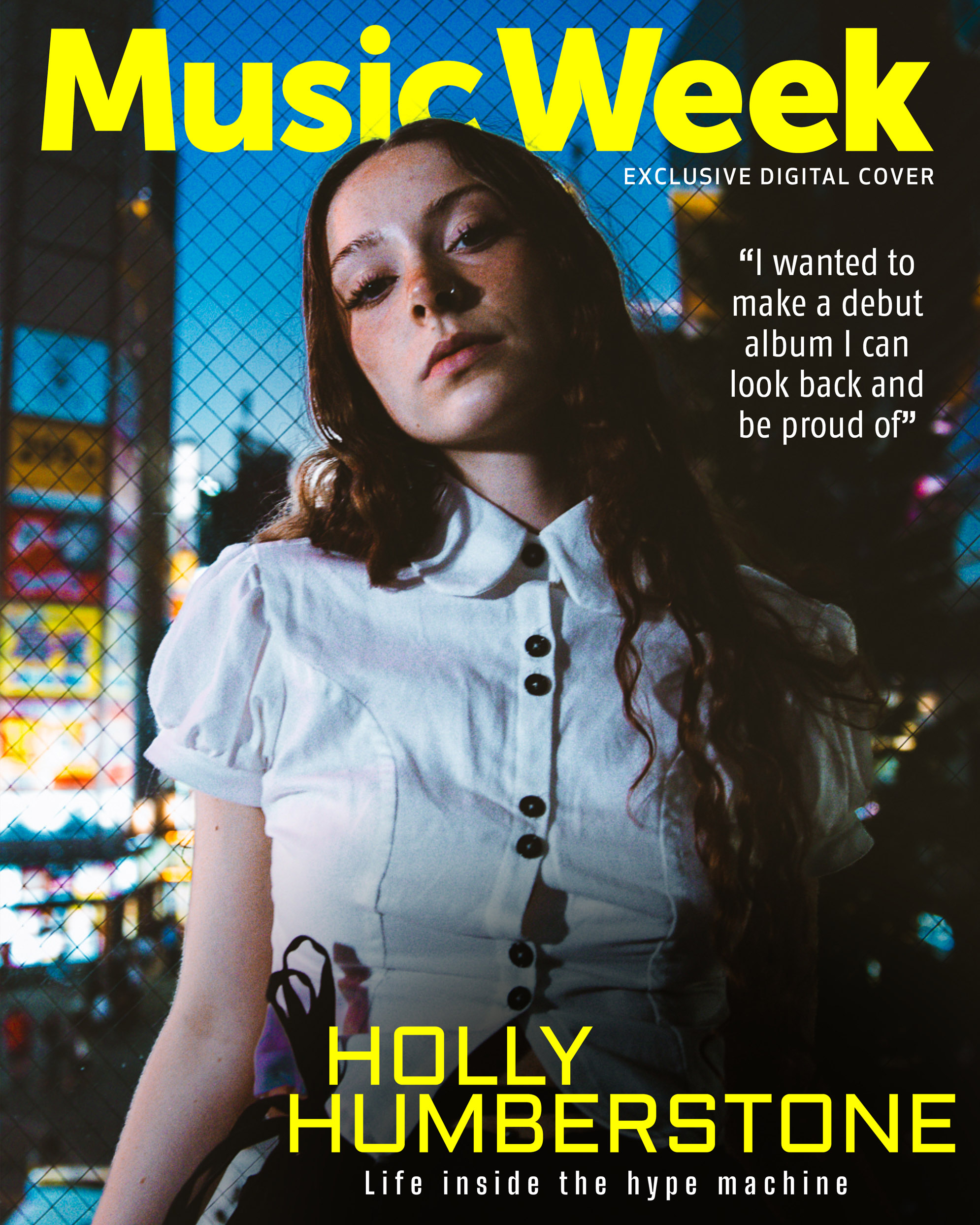
First of all, congratulations on the album. For fans who have been following you since your debut single, which came out just before the first Covid lockdown, it has felt like it’s been a little while in the making. Has it felt that way to you?
“It hasn’t felt like a long time at all. But I just didn’t want to rush into it. I don't want to, I don't see why I should rush things. I want to get my songs right if I'm going to share them with the world – they are so personal to me. I’ve released an EP per year since 2020. I've been really, really busy with touring and stuff, which has been so fun, but it's definitely taken me like a little while to adjust to that and balancing touring with getting into the studio and having time to write and to have a social life to have things to write about. Obviously I write to share my songs with people, but mainly I write for me, and for my mental health. The best way to preserve my mental state is just going into the studio and writing. I wanted my debut album to be something that I could look back on and be really proud of in years to come. I definitely tried to write fast, but it just doesn't really work like that. It takes time if you want to get it right and deliver an album that you're proud of. So I took my time with it, and hopefully people aren’t disappointed.”
Are you proud of the finished product?
“Yeah, I am. It's always really difficult when you come up to release stuff. For me, the best part of my job is being in the studio and getting to create. And then the scary part of it is having to release it. Because I'm having to be on my phone. I'm having to be on social media and talk about it all the time. And I mean, if that's the worst part of my job, then I'll take it! I know that I was really proud of the songs when I wrote them. I'm trying not to let the external stresses of releasing music affect the fact that I really love all the songs individually. I put so much of myself into it. So I'm just trying to remember that and nothing else really matters. Except for the music and people feeling like they can connect to it. At the end of the day, I can read as many comments and reviews and it's all gonna stress me out, but the only thing that really matters is that I'm putting the music out and that I've been authentic.”
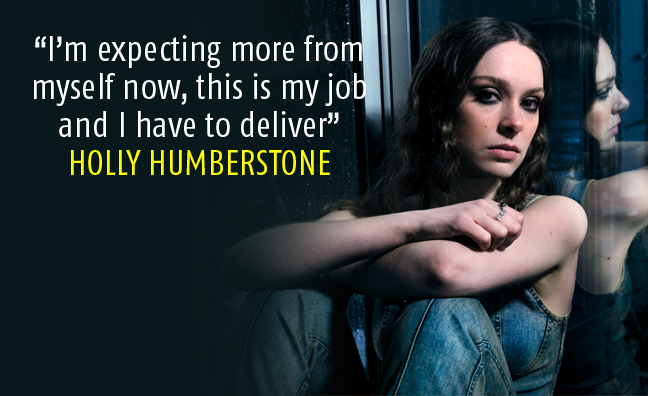
Would you say you’ve changed as a songwriter and an artist since you started putting out music?
“Another reason why the album has taken me a little while is because of the pressure I've put on myself now that I have an audience and a team that is expecting things from me. And I'm expecting more from myself, I think, because it's my job and I have to deliver. So I think that's also why it's taken me a bit longer to nail the album. I don’t know if it’s a good thing, but I think about things a bit more, which can get in the way, but also can be really good, because I'm thinking about every lyric and how everything has to be perfectly crafted. Thinking about the lyrics more can sometimes be a really good thing, and other times I can get in my head and that can get in the way a little bit. But I'd like to get to a place where I was when I first started; that version of myself where I can just go into the studio and just try not to think about the pressures, because it's always been my favourite thing to do. It's my hobby. I'd like to get back to that, the love of it again, you know? I still love going to the studio and writing but now it's my job. Now I have to deliver.”
How has your team supported you through the process?
“There's always a bit of pressure. But I honestly think that I have a really, really supportive team. That's something that I'm really proud of. My manager and I have been really careful since the start of my career. I'm really really grateful to Josh [Sanger] because I feel like he has perfectly curated a really, really supportive team in every aspect of the job, label-wise, but also touring-wise, even down to my hair and make-up team. Everything feels like a big family. I'm spending all my time working, which is great, but also I feel like my best friends are the people that I work with, or some of them anyway.”
How much has overthinking been a problem for you?
“Overthinking, honestly, is my biggest issue. I'm my biggest critic and it’s become more of an issue the closer I've got to releasing the album. I always thought that it would go the other way – that the more success that you had, the more positive feedback you got or the more opportunities you got, the less you’d be thinking about it and putting pressure on yourself. But it really just blows it all up, because I feel like I've got more to prove constantly, and I've got to deliver and constantly one-up myself and beat my last thing or write about a better song than Scarlett or something. It’s definitely been my biggest challenge, in all aspects of my career – in playing shows, in writing music and on social media. I'm yet to find a solution for it. I think that that sort of thing will probably come with time – I hope.”
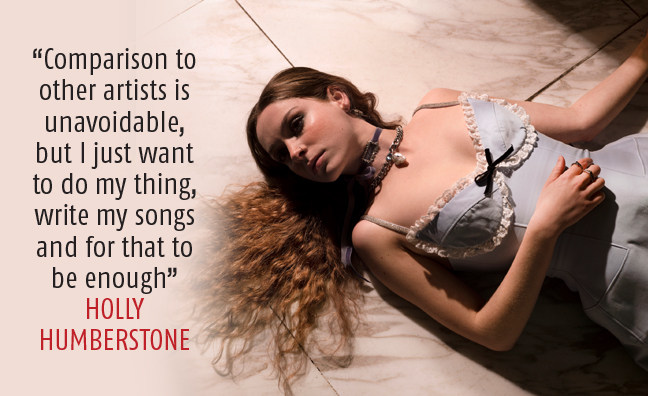
How do you get help with that? Do you have anyone mentoring you or have you tried therapy?
“Yeah. I think that it's important to have people to talk to you for sure. Having therapy I think is really, really important. And just having like a core group of people I found outside of my music has been really useful. I live with my oldest sister and I see my friends as much as I can when I'm at home. I don't have loads of friends, but the ones I do have are like my core people that I really love and trust. And I really think that having those people that I can go home to who couldn't give less of a shit about my career… We're all trying, we're all doing our best. We're all in our early 20s just trying to figure things out and trying to pay the rent and figure out how to pay bills. You know what I mean, being a young adult? So there's loads of other stuff that they care more about than my career, obviously. So it's really nice to have those people as well. I've relied on them a lot over the past few years. I've really, really valued my friendships and my relationships a lot more than I ever have.”
You worked with Rob Milton again on this record, but also Ethan Gruska, who has produced a lot of Phoebe Bridgers’ music. When you last spoke to Music Week, you mentioned that the co-writing process can sometimes feel awkward – particularly when you’re placed in a room with a 40-year-old man and expected to be open and talk about your feelings. How do you feel about that now? And why was Ethan a great fit?
“There’s still a bit of that, for sure. But I think it’s important for me to be pushing myself out of my comfort zone. Rob and I work really well together and I’m so grateful for that relationship. We can get into a room and write however many songs together. But it also really does help to bring new ideas in. It’s normal for stuff not to work sometimes and that’s okay. Songwriting is a really intimate thing and I’m not going to click with everyone I go into a room with. We’re all really sensitive. But it was a really happy accident working with Ethan. I was in LA and I’d been writing and putting a lot of pressure on myself and things weren’t really going to plan. So I reached out to Ethan and went to his little studio, just outside the city and wrote Into Your Room. It was just a really fun day. And then he came to London and we did some more stuff and wrote Lauren which made it onto the record. I honestly write my best stuff when there’s less pressure attached. It was just a really relaxed, chilled environment.”
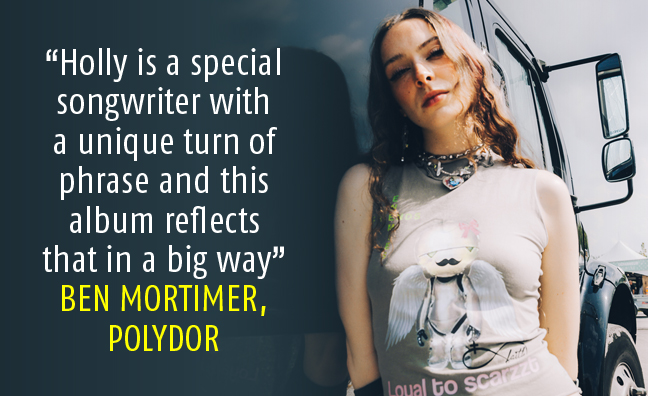
In both those songs on the album – Into Your Room and Lauren – it sounds like you’re processing some guilt around your rise to fame, that you’re not there for the people at home as much as you’d like to be, than perhaps you could be if you didn’t have this career.
“Yeah, I think that was something that I wrote a lot about, actually. I wrote songs like Antichrist and Flatlining about romantic relationships that I felt I wasn't really present in. I'm just generally quite self-deprecating. I mean, we all are. But I'm very empathetic. And I constantly feel guilty about not being around for those people that I really, really value. I wrote a lot about being away from my friends. When you're on tour, it's so intense. Especially when you're abroad and you're in a new city every day. You have promo or loads of content and stuff to do in the day, then you've got a show. And then I get into my hotel room at night, and shut the door and it’s deathly silent. And I just feel really, really anxious and scroll on my phone. A lot of the time I honestly wouldn't have the energy to call my mum for weeks. It wasn't that I wasn't thinking about them the whole time and missing them. It was just that I just didn't have the fucking mental energy to go on my phone and connect with them and touch base. So I'd be scrolling at night and seeing everything that they were getting up to… I got FOMO really bad, but also I think I felt guilty that these friends – these real true friends – would always be checking in on me and I have like a million unread messages from everybody that I just somehow can't get back to for some reason.”
When you were on the cover of Music Week at the start of last year, you talked about a sense that women in the industry are pitted against each other, that there’s only space for one person to succeed. Has that situation improved?
“I mean, it creeps in. It's really hard to avoid it. I know this is so cliché, but social media makes that stuff really, really hard to avoid and you can't really block it out. Because as soon as you open Instagram or TikTok [you see it] or your team will take what other people do as inspiration and say, ‘You should make a video like this girl.’ It’s impossible to avoid because everyone's taking tips and tricks from other people, which obviously is a really cool thing about social media, but it's really impossible sometimes to just see my path and not let everybody else come in and stress me out. It's really, really hard to focus, especially when we're being constantly compared. I get a lot of, ‘You sound like a mix of Taylor Swift and Olivia [Rodrigo].’ It's unavoidable to be compared to other people, but it's hard when you just really don't want to think about other people's careers. I just want to do my thing. I just want to write my songs and for that to be enough.”
You’ve toured with Lewis Capaldi and you have always talked very openly about the importance of looking after your mental health. What did you make of Lewis’ documentary, what happened to him on stage at Glastonbury and his honesty around needing to take a break?
“I can see it happening really easily. There can be as much support out there for you, but I can still really see that happening at the end of the day. I'm sure that there was a lot of pressure on Lewis from so many different angles, but I really do think that the internal pressure – I see it in myself every day and I see a lot of other artists too, no matter how well you're doing. I can't speak for Lewis, obviously, but I could see how it would be really easy to get to a point where you are just at breaking point and you can't handle it anymore. I think that it's really brave of him to be so open and honest about it. But I also don't really think that he had a choice. For somebody who's so public and shares so much of their personality with the world, I think maybe he wasn’t given a choice as to whether he wanted to share that – that he was forced into it. From an outside perspective, that's what it looks like. I just hope that he can get the support he needs. And I hope people take that into account when moving forward. I know that everybody has to get paid and everybody's employed by this one person and there's a lot of pressure on them. But the show can't go on if this person is physically and mentally unable to do all the things that need to be done.”
Do you think the industry is increasingly more understanding of that? Is there more support than there used to be?
“Well, I don't know how other teams really operate but for me, it's definitely been about learning how to set boundaries. I'm definitely still learning how to understand myself a bit more and how much I can take on. It's about learning how to say no and to preserve that time that I do get for myself. It has become so much more important for my mental health. In the end, everybody means well, but sometimes that can only go so far, when somebody really, really needs a break.”
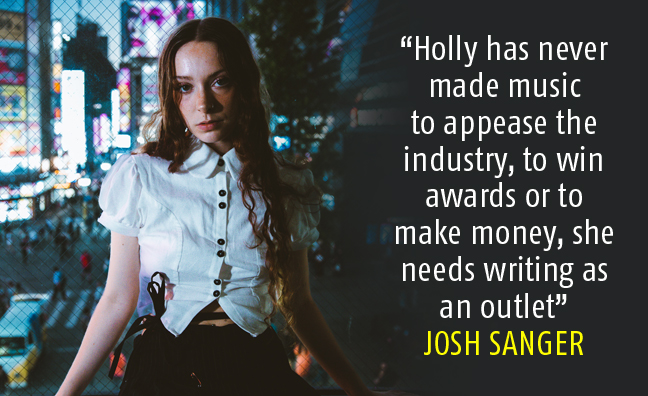
Have you been able to work around that when it comes to planning your schedule?
“I don't know, again, what it’s like for other artists, but I have my next two to three years already planned out – my touring schedule, when I'll have time to write my next album – I've got a pretty rigid plan until the end of next year. I can't even begin to think about that far in the future yet, but it's already a plan. So I do feel like the support is there, but then there's always pressure to carry on. And pressure is important because it's important for everybody on the team and the artist to be motivated and to have a plan and to want to reach their goals and go above and beyond and keep progressing and getting further with their career… But yeah, that can be very, very intimidating, and can put you off.”
What do you do when things get tough?
“It's easy to spin out. I think about how much that I've got to get done and sometimes it's really hard to know how I'm going to preserve my mental health when I'm going to be touring for the next year straight. And then I've got, say, a couple of weeks break to write my next album, and I haven't really had any experiences to write about. But it's not a terrible thing. I love the job so much. I wouldn't want to be doing anything else. But, I've had to be like, ‘When do you think I'm going to be able to write this album?’ Because I'm gonna need time to actually get to gather experiences, and then turn them into songs. And, you know, you can't just block out two weeks and expect like, ‘Oh, you should probably be able to write all the songs in two weeks.’ It doesn’t really work like that.”
In terms of Paint My Bedroom Black, what would success for this album look like to you?
“I feel like I’ve had such a long career already! There was something about starting off on an independent label that bought me a bit of time to hone my sound. Going from there to Polydor was a really easy transition, because I already had that nailed. I’m obviously still figuring out who I am – and I think my sound is a bit different from my older stuff because I’m a different person now. But I’m just really grateful to be doing this and that I’ve been able to get to the point where I can release an album and that people – even though it has been a little bit of a wait – are ready to listen, happy to wait for it and still want to buy tickets to my shows. I just need to try and not let other people's opinions sway how I view myself. Writing is my whole world, it's like my child – I couldn't care about writing more. But there's something really terrifying about opening yourself up to criticism when it's something so dear to you. Releasing music is a bit dangerous for that reason. I've just got to try really hard to not read into it too much, because it's not going to be for everybody. And that's okay.”












